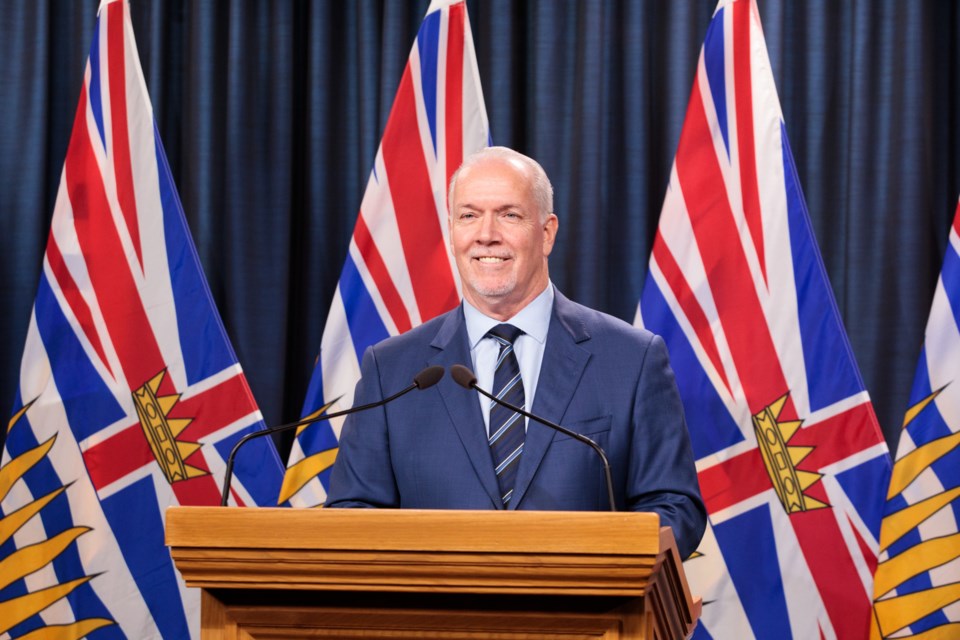BC’s governing New Democratic Party held its first convention since winning last year’s decisive majority government, and even a casual observer would have come away impressed at the party’s dominant hold currently on the provincial political arena.
Premier John Horgan opened his speech with good news, that the radiation treatment he’s just started for throat cancer has an estimated 90 per cent success rate to return him to full health.
“I’m very optimistic about the future,” said Horgan, kickstarting a speech to the virtual delegation with a dedication to BC’s health care system for not only his treatment but standing up to almost two years of the COVID-19 pandemic where other health sectors, in other jurisdictions, have verged on collapse.
Horgan’s optimism appears well-founded.
The party has gone from a crushing $2 million debt and selling its headquarters after the 2013 election loss, to more than $7 million in cash in its war chest today, along with a newly-purchased building at 34 West 7th Avenue in Vancouver that has tenants and provides a steady stream of rental income, according to a report by outgoing party president Craig Keating.
Even the $1.1 million it borrowed to fund last year’s ruthless snap election campaign in October was paid off by January. A $1 million “strategic investment fund” designed to “direct investments in battlegrounds” during an election campaign has already been replenished to $460,000 with three years to go, reported treasurer Jaime Matten.
It’s the kind of rosy financial picture the BC Liberals and BC Greens could only dream of, and another reminder of the fundraising perks of being in power. Also, let's not forget some of it is built on the underpinning of new per-vote public subsidies for political parties — though all parties voted to support that change in the legislature this fall.
But it’s not only money.
New Democrats have invested in ongoing ground-level training, including “Level Up,” a virtual five-week “training blitz” during the pandemic with “more than 1,200 activists from across Canada,” reported Keating. A new “Forward BC” training session is planned for June.
“And today, we have a vast and dedicated crew of campaigners in every corner of the province,” he said.
This should give the other parties great pause.
The BC Greens can barely field a full slate of candidates in BC, and in some rural and remote areas are non-entities entirely.
The BC Liberals were drubbed in Metro Vancouver in the 2020 vote, and an election post-mortem report partly blamed weak organizational skills in many incumbent ridings, as well as in headquarters. The BC Liberals have been reduced to a powerbase in the interior and north. If the BC NDP can somehow put a ground game in place in the province’s more rural communities (where it will definitely be an uphill battle, given its policies) that could chip away at the BC Liberals, it may even become the coup de grace of the governing party’s dramatic political comeback.
“While constant election readiness was the watchword of our first minority government, the lesson we must take from these years is that it takes a full term to build a winning, modern election campaign,” wrote Keating in his report.
“That work begins now.”
Still, it’s not all good news for the New Democrats.
During Horgan’s speech, he rattled off a list of accomplishments on key files like housing affordability, the overdose crisis, forestry and old growth protection. As much back-patting as the BC NDP would like on those files, critics will just as easily be able to find stinging criticisms — skyrocketing housing prices, worsening overdose deaths and widespread unhappiness in most of the forestry sector and amongst First Nations.
There were also open pockets of dissent in the convention, which were quickly quashed by convention chairperson Susanne Skidmore, who had the backing of a majority of members to cut off at least a couple of people Saturday morning who wanted to complain about the party’s direction and the premier. But that’s not unusual for New Democrat conventions, even when the party is winning.
What was new was a pocket of “climate-informed members” under the organization of Extinction Rebellion’s Howard Breen, who tried to organize support for a leadership review to oust Horgan.
“Let us all seriously hope the climate responsible membership (also angered by the third paramilitary raid of the Wet’suwet’en and ongoing old growth logging and expansion of raw log and wood pellet exports) prevails and achieves majority support,” he wrote in an open email.
But amongst BC New Democrats, there is deep dislike for Extinction Rebellion and its tactics of blocking highways during rush-hour, and organizing mock hangings to symbolize the future deaths caused by climate change. The group’s sharpest critic is Horgan himself, who was infuriated when Extinction Rebellion showed up to his house a couple of years ago and scared his wife.
Perhaps it’s no surprise then that the leadership review idea picked up very little support. Horgan sailed through with an 83 per cent vote against holding a leadership convention.
Only the most spiteful of members would vote against Horgan at this point, given he has enjoyed a public approval rate that tops Canadian premiers the past four years.
Horgan’s favourability and performance ratings are still more than double that of the BC Green and BC Liberal leaders, according to a new poll by StratCom. It’s a New Democrat-friendly polling firm, but its numbers match up with those from the major polling agencies over the years.
All in all, the New Democrats are poised to come out of their annual convention on a high.
“Be part of the solution,” Horgan said in his rallying speech. “British Columbia is filled with New Democrats, they just don’t know it yet.”
Rob Shaw has spent more than 13 years covering BC politics, now reporting for CHEK News and writing for The Orca. He is the co-author of the national best-selling book A Matter of Confidence, and a regular guest on CBC Radio.



